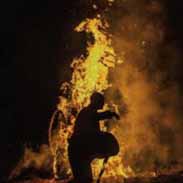Hume (Enquiry Concerning Human Understanding)
Unlock all answers in this set
Unlock answersquestion
What is the difference between an idea and an impression, and what are Hume's arguments that our ideas are copied from our impressions? (Section 2)
answer
Impressions/Ideas distinguished by force and vivacity Impressions: the liveliest. Ideas: are faded copies of impressions
question
Why does Hume think that "the missing shade of blue" is a counterexample to his theory that all ideas depends on previous impressions? Do you agree that it's a counterexample? Why or why not? (Section 2)
answer
Hume sees the missing shade of blue as the one counterexample to that all ideas depend on previous impressions. Not a counterexample: because it illustrates the principle that our imagination may compound simple ideas to create more complex ideas. Color, in this instance, is a complex idea made of many simple ideas. The imagination is able to combine the proper array of simple ideas, each derived from the shades of blue on other side of the gap, to create the proper complex idea.
question
What are the key differences between a relation of ideas and a matter of fact? Give examples of each. (Section 4)
answer
Relations of ideas: cannot be contradicted —all sisters are female Matters of fact: can be contradicted—the earth revolves around the sun
question
How does Hume support his point that all matters of fact are founded on the relation of cause and effect? (Section 4)
answer
All matters of fact are grounded in experimental reasoning. Can never be sure the sun will rise tomorrow, but we know it's likely based on how often we've seen the sun rise in the past. Experiences condition us to associate a cause with an effect
question
When Hume brings up the example of one billiard ball's striking another, why does he point out that I could conceive 100 different events following from the impact of the first on the second? (Section 4)
answer
Can only infer how the ball will move based on experiences. Nothing in the cause will imply the effect, we can only know once it has happened. We can't assume an effect until we've seen it play out
question
Hume identifies custom or habit as a special principle of human nature that determines us to a very important activity. What is that activity, and why can it only be custom and habit that determines us in this way? (Section 5)
answer
Custom determines inference, makes our experiences useful. Without custom, we would be aloof of all matters of fact b/c we would not be able to infer causal relations. Custom and habit allow us to apply our experiences to a present event.
question
What is the difference, according to Hume, between entertaining a fiction and holding a belief--for instance, between regarding Santa Claus as a myth and believing that Santa Claus rides a sleigh on Christmas Eve? (Section 5)
answer
Belief is a more vivid and lively than imagination. Fictions become beliefs when there is more feeling associated with it (comes through experiencing an idea). Belief helps to distinguish the ideas of judgment from the fictions of the imagination.
question
How does Hume argue that we do not have a legitimate idea of necessary connection? How is this related to the problem of whether the conclusions of inductive arguments are certain? (Section 7)
answer
Posses no sensory perfection of cause, but can infer an effect based on experience. So, not positive sun will rise, but can infer it will based on past experiences.
question
If an impression of necessary connection is not given in experience, what does this imply about knowledge of the external world, for an empiricist? Would a rationalist think knowledge is affected by this point? (Section 7)
answer
Empiricist: No certainty in external world Rationalist: Can use reason in external world
question
What is the difference between our seeing events as causally connected and as merely correlated, on Hume's view?
answer
Causally connected: implies a force that is not there/ event is never observed by humans Merely correlated events: associated in our imagination as highly likely to be together. The sight of one brings to mind the idea of the other
question
What does Hume finally conclude is the sentiment or impression from which we derive the idea of necessary connection, and what does habit have to do with the experiencing of this sentiment? (Section 7)
answer
The impression from which we derive the idea of necessary connection is an experienced constant conjunction. Simply a certainty that what we think will happen will happen. Habit affirms these feelings of certainty
question
What part does the imagination play in producing the idea of necessary connection? (Section 7)
answer
Imagination is where we make connections between the two objects. Imagination drives inference when coupled with habit
question
What do you think of Hume's analysis of causation?
answer
Very hard to argue
question
On what grounds do we evaluate the reliability of testimony? (Section 10)
answer
We evaluate testimony on; its coherence with other accounts, the consistency of argument, the character of testifier, and relationship between the testifier/the testament
question
How does Hume define a miracle? (Section 10)
answer
Hume defines a miracle as going against the laws of nature that we have drawn up based on past experiences
question
Why does Hume think that belief in miracles is unreasonable? (Section 10)
answer
Hume's Maxim: No testimony is strong enough to establish a miracle unless the proving the testimony wrong is more miraculous than the act itself. Believes you can counter any testimony with evidence/experience. Evidence that is based in repeated experience
question
Do you find his argument about belief in miracles persuasive? Why or why not?
answer
Opinion



